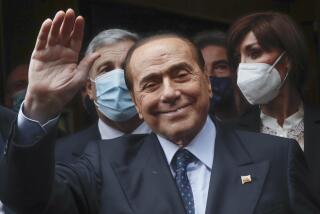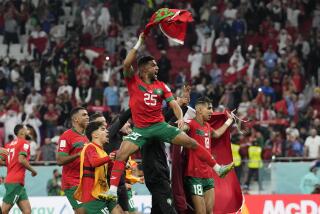Uruguay’s Francescoli Stands on Threshold of Soccer Fame, Fortune
- Share via
His full name, for those with a precise turn of mind, is Luis Enzo Francescoli, but he is known simply as Enzo Francescoli.
In 1983, when his Uruguayan club, Wanderers, sold him to the Argentine club River Plate for $400,000, he was just another promising 21-year-old soccer player who was of more value to his team for the money he could bring than for the championships he could help it win.
Francescoli was not worried about being sold--if not down the river then certainly across it. He knew he had a better chance of making an impact in Buenos Aires than in Montevideo, and he was right.
In 1984, after finishing the season as the top goal scorer in Argentina, Francescoli was named South American player of the year. It was not just a matter of how many goals he scored, but how he scored them. Spectacularly.
Last year, he was one vote shy of repeating as the continent’s best player, finishing second behind Paraguay’s Julio Cesar Romero, the former New York Cosmos star.
And now Francescoli stands on the threshold of not only fame but also fortune. It all depends on what he and his country accomplish in this summer’s World Cup in Mexico.
Uruguay, which will play Mexico in the Coliseum at 5 p.m. today in a World Cup warmup, is one of the favorites to win this year’s tournament. Francescoli is a big reason for that.
Francescoli, at 24, is just now coming into his prime as a player. Tall, powerful and surprisingly quick, he is as dangerous in the air as on the ground.
Poland will attest to that. When the Polish World Cup team played River Plate in giant Estadio Monumental in Buenos Aires a few weeks ago, Francescoli almost single-handedly beat the Poles.
River Plate was trailing, 4-2, with less than 10 minutes to play when, in an astonishing turn of events, it scored three times and won, 5-4.
Francescoli scored three of the five goals, including a stupendous game-winner on a bicycle kick with his back to the Polish net seconds before the final whistle. Even the Poles, third in the last World Cup, were forced to applaud that effort, brilliant in both its conception and execution.
In short, Francescoli is the kind of player who can, in one or two devastating moves, completely change the outcome of a match. That makes him a prime target for Europe’s wealthier clubs.
Already, River Plate has been tempted by offers as high as $1.4 million from the Italian team Lecce, which very much would like to buy the brightest star to emerge from Uruguay in decades. Lecce’s offer, and others, have been rejected, however, and River Plate officials have put a $2.5-million price tag on their midfield marvel, which is not altogether unrealistic.
It is certain that he will not move anywhere until after the World Cup, and by then his value might have risen.
Whether Francescoli will be able to perform as well for his national team as he has with his club side is the question that many Uruguayans are asking, not least of all Omar Borras, coach of the national team.
For the past four years, ever since the day after Uruguay failed to qualify for the 1982 World Cup in Spain, Borras has been trying to piece together a team that can regain the country’s glories of old. Uruguay won the first World Cup on its home soil in 1930 and added a second world championship by winning in Brazil in 1950.
But it has not been easy for Borras. Uruguay’s best players, like Francescoli, are scattered all over the world. No fewer than 14 of his 22 players play abroad--four in Spain, four in Brazil, two in Argentina, two in Colombia, one in France and one in Greece.
Uruguayan clubs are not well off financially, so when they discover an outstanding talent in their ranks, it generally is not long before he is sold to wealthier teams elsewhere. In the last two years, more than 40 top Uruguayan players have left their homeland.
Borras’ task has been to reassemble the players and, in a short time, give them an identity and a team spirit. His success can be gauged from the fact that Uruguay is the reigning South American champion, having won that title in 1983. Last year Uruguay easily qualified for the May 31-June 29 World Cup in Mexico by beating Chile and Ecuador.
“Borras has been able to do something which Uruguayan coaches had found difficult for a long time--form the players into a real group,” Francescoli said in an interview in London’s World Soccer magazine.
“He is also a man who listens a lot to his players . . . their suggestions and problems . . . and that is very important from our point of view.”
The key to how well Uruguay does in Mexico is Francescoli, who has been receiving some flattering reviews in the European sports pages despite an unimpressive debut on that continent last year. France beat Uruguay, 2-0, in a game matching the European and South American champions.
“Enzo Francescoli is one of the team’s stars, an attacking midfielder who, because of the frequency with which he finds the way to the goal, reminds one a little of Michel Platini,” wrote Bernard Charrier in the Italian sports weekly, Guerin Sportivo.
The comparison to France’s Platini, the world’s No. 1 player, may be a little too kind, but the point is that Francescoli has the potential to become a star of that magnitude.
Significantly, he also has the desire to test himself against Europe’s best.
“Every South American professional is interested in continuing his career in Europe because it does not only mean financial improvement but furthering one’s career,” he told World Soccer magazine.
The World Cup gives him the opportunity to do just that, but it is more important to the expatriate Francescoli that his country does well.
“I only want my team to do well,” he said. “If it doesn’t, I will not have much of a chance to shine, either. . . . We have certainly drawn the toughest first-round group . . . a lot will depend on whether we start well.”
Uruguay’s first-round opponents are three of Europe’s top powers--West Germany, the runner-up four years ago, Scotland and Denmark.
Francescoli believes, however, that he and his teammates are a match for anything the Europeans have to offer.
“The South American player has ability and the creative spirit which can make the difference anywhere in the world,” he said. “I think the best soccer in the world is played in Argentina and Uruguay.”
Those who have seen the latest gem Uruguay has produced and Argentina has polished would not argue that point. Luis Enzo Francescoli is a glittering example.
More to Read
Go beyond the scoreboard
Get the latest on L.A.'s teams in the daily Sports Report newsletter.
You may occasionally receive promotional content from the Los Angeles Times.






